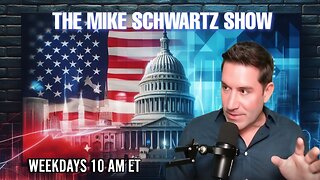Premium Only Content

DISGRACE: Netanyahu to Address a US Congress TIED TO THE HIP to Israel’s War Machine (Brian Becker)
I'm Afshin Rutansi, and welcome back to Going Underground, broadcasting all around the world from the UAE. Amidst the ongoing UK-US-EU armed Gaza genocide, it's been a week since the likely next president of the USA survived a shot to the head in suspicious circumstances. The Pennsylvania assassination attempt on Trump came after years of US military-industrial-media censorship complex attacks on him for being an unpredictable servant of oligarch power, as opposed to the faithful, demented lapdog Biden. Will either make any difference to the slaughter of Ukrainians and Palestinians in the US proxy wars, or is street protest rather than elections the only peaceful means open to Americans wanting an end to US international wars on the poor? A reason why a Supreme Court decision has de facto banned political protest in Louisiana, Mississippi, and Texas. Next week, the Answer Coalition will try to surround the Capitol building in Washington, DC. They will demand the arrest of Israeli PM Netanyahu, as he addresses the US Congress. Brian Becker is the national director of the Answer Coalition and joins me now from Washington, DC. Brian, thanks so much for coming on. You've been organising demonstrations in the streets, publishing against the powerful for decades. I mean, how has it come to this, you needing to protest the idea of Netanyahu accused of genocide addressing your corrupt politicians next week in the Capitol in DC? Well, it's not the first time that Netanyahu has addressed both houses of Congress. When President Obama was pursuing the Iran nuclear arms deal, so-called, Netanyahu came to both houses of Congress and basically trashed the most important foreign policy objective of the then sitting president of the United States. And again, he received standing ovations from both sides of the aisle. It's even more disgraceful though this time, much more disgraceful, because the whole world has watched in real time, in real time, a genocide carried out by Netanyahu, orchestrated by Netanyahu. Netanyahu is the singular person who has done the most to prevent the ceasefire from taking place. And for Netanyahu to come at this moment to speak before both houses of Congress, to receive a hero's welcome, a hero's welcome from both of the establishment parties, it's a real disgrace. Prior to his address to Congress, he will be meeting with Biden in the White House on July 22nd. So we have protests going on for all three days, but on July 24th, when he speaks before both houses of Congress, tens of thousands of Americans of all walks of life will be surrounding the Capitol saying no to genocide and saying, yes, Netanyahu should be arrested. As a matter of fact, we're gonna have a giant arrest warrant, which people can not only observe and hold, but sign on to. And again, this is a mass movement that exists in the United States. It's something really different for Palestine. It's been going on since October 8th, the day when the Israeli massacres really began. And we see a sea change in consciousness at the grassroots in America, but in Congress, it's the same old Congress, the same old plutocratic Congress tied at the hip to the Israeli war machine. Yeah, polls show 64% of the US public want a ceasefire despite Biden's envoy to the UN, Indra Thomas-Greenfield, putting her hand up to veto the ceasefire at the UN Security Council, famously. As to the difference, and it's bipartisan, those demonstrations you're helping to organize. As to the difference between Trump, the expected president in November, and Biden, is the forecast that Trump would just speed up the genocide, whereas Biden will keep it at its current pace? Or would Trump do something to save the lives of all those millions of Palestinians who now face death or starvation or a life-changing injury? Yeah, I think the variable here is what's going on in the ground in Gaza and what's going on in the ground throughout the Middle East, and I would include there in Lebanon. Left to their own druthers, so to speak, both Biden and Trump would want Netanyahu to have a full, all-out military victory, destroy Hamas and the Palestinian resistance once and for all, but that's not possible. And so if the aspiration of Trump or Biden is to completely eliminate the Palestinian people and their just struggle for self-determination and freedom, they're kidding themselves. That's not going to happen. Even now, after nine months by this powerful Israeli military, armed to the teeth, being resupplied with tens of billions of dollars of weapons, including 2,000-pound bombs, 1,800-pound bombs by the Pentagon, they haven't secured their military objectives of the defeat of the Palestinian resistance. They have succeeded at killing a lot of people. They've succeeded at killing a lot of children and their mothers and their grandparents. They've succeeded at making people in Gaza homeless and succeeded in causing famine, but they haven't succeeded militarily. So in terms of whether Trump or Biden will be a decisive difference, it's not all up to them. Yes, they have a lot of power. Yes, they have a big military, but the Palestinian resistance has shown by its resilience that it's not able to be conquered at this point. But whereas Trump clearly, and his vice president nominee, J.D. Vance, clearly favor a ceasefire agreement or a peace agreement about the war in Europe, things J.D. Vance has said, let alone what Trump has done and said, shows that any expanded war into Lebanon, into Iran, Syria, Iraq, would be more likely under a Trump presidency than under a Biden administration, or it doesn't really make any difference. I should add that Biden is still in the race at the time of this recording. Well, let's think back. Just we can hypothesize based on some recent history. Trump ordered the execution of General Soleimani in the Baghdad airport, January 3rd, 2020. Pro-Iranian forces in the region and Iran itself retaliated and struck U.S. military bases in Iraq. They struck 12 of them. And after that, Trump, instead of retaliating back, actually stood down because the U.S. realized that if they went forward with this war, a full-scale war with Iran, U.S. forces would suffer very heavy casualties. They're very vulnerable throughout the Middle East. So again, if it was just up to Trump, I think Trump would be glad to be a partner in genocide, a real, complete genocide. Biden, maybe not a full, complete genocide, a complete extinguishing of the Palestinian people in Gaza, but certainly embracing Netanyahu's objectives of all-out military victory. So I think in that sense, they're both the same. Trump is more, less prudent, let's put it, than some of the U.S. other policymakers, more reckless, more open to provocation. But I think aspirationally, they're about the same. And again, I think their power, though, is limited. Biden, Blinken, Sullivan, they've been clear that these wars are good for the U.S. economy, quite brazen about the idea that hundreds of thousands of Ukrainians killed on the battlefield in the proxy war on Russia is good for business and good for ordinary workers in the United States. How do you weigh up what it means for blue-collar workers, the American carnage, famously, as the expression went in the Trump inauguration speech? How do you compare them both? Because the head of the Teamsters is at the RNC convention and will be at the Democrat National Convention. Well, I think this notion that endless war is good for working people in the United States is not only false, it's basically rejected by most American workers. You look at the surveys and the polls, most people want a ceasefire in Gaza. And most people, including many who vote Republican, but many who vote Democrat, too, are disgusted that the United States is sending hundreds of billions of dollars for endless war against Russia, a proxy war in Ukraine. Yeah, but the U.S. government says it's recycled through so that it ends up on Main Street, USA, rather than to Zelensky's forces or to Netanyahu's. Well, in one sense, that's true. Much of the money never leaves the United States. It's really just contracts being signed with military industrial complex contractors. But those are capital-intensive industries. There's not many workers there, actually. Most cities in the United States do not have large numbers of industrial enterprises pumping out weapons. It's a very high-tech industry. It's very capital-intensive. It's not labor-intensive. And a lot of the subcontracting actually is taking place outside the United States. So the idea that this is a great boon, economic benefit, sort of a poisoned benefit that accrues to American workers is largely a fiction. But it's part of the demagoguery of the two parties who always say, as you mentioned, Blinken, Sullivan, they'll say, oh, it's good for American jobs. This is the same thing Reagan pushed, George H.W. Bush pushed. That's what Bill Clinton pushed. That's basically not true. The American people are spending $1.5 trillion. That's the real military budget, by the way. It's about $900 billion in the Defense Department. But hidden in the budget is another $600 billion that's going for the manufacture of weapon systems and the maintenance of the U.S. military-industrial complex. That's good for Wall Street. That's good for the banks. That's good for American capital. Not really a great benefit to the American working people. Yeah, because Biden continually repeats these talking points that he's a friend of the unions. You might have to remind us of what he did enacting legislation against the railway transport workers to stop a nationwide rail strike. I mean, Biden is not pro-union, is he? No, he's not pro-union at all. I mean, he's slightly less evil than the Trump National Labor Relations Board, but he's not pro-union. As you mentioned, that anti-union legislation wasn't enacted by Biden. It was enacted a long time ago, but it was implemented. It was imposed on the railway workers' unions by Biden this time. Because frankly, railway workers, if they go on strike in two weeks, could shut down the entire capitalist economy in the United States. That's how important rail is. So in these really important industries that are decisive and that would give working class people strategic leverage over government policy, those strikes are illegal. Same in different other key industries, including public service, government workers, transportation, et cetera. So Trump, I mean, Biden is pretending to be pro-labor because he wants hundreds of millions of dollars of labor donations. More and more workers, by the way, are turning against that. They're saying, let's stop funding either the Republicans or the Democrats. Let's use that money to organize unorganized workers. And 50 years ago, 33% of the U.S. workforce was union. Today, it's 6% in the private sector, 6%. It's one of the least unionized workforces in the country, which means workers don't have rights. You can be fired at will. You don't have benefits. You can be laid off on a moment's notice and your wages can be driven down. So Biden has done nothing for unionization except like mild some sort of talking points for labor, but he's done nothing. Brian Becker, I'll stop you there. More from the National Director of the Answer Coalition and host of the Socialist Program podcast after this break. Welcome back to Going Underground. I'm still here with the National Director of the Answer Coalition and host of the Socialist Program podcast, Brian Becker. Brian, at the end of part one, you were talking about how easy it is for workers, arguably, to shut down the United States. How precarious is the United States system right now? Many people saying that if the bullet had hit Trump a few millimeters one way or the other and Trump had been assassinated, there might've been civil war. How unstable is the republic? It's just below the surface. Very, very, very unstable with tens of millions of very angry people. Some vote Democrat, some vote Republican, some don't vote at all. That would be the majority, in fact. But there's a lot of anger. There's a lot of discontent, a lot of alienation. When you think back to the 1960s, we had JFK. He was assassinated November 22nd, 1963. After that, the massive escalation of US involvement in Vietnam took place. Five years later, his brother, Robert Kennedy, was assassinated after he won the California primary, meaning he would've been the Democratic nominee and very likely would've beaten Richard Nixon. And he had pledged to end the war in Vietnam. He was shot dead. And then Richard Nixon continued the war for five more years. A million more Vietnamese died, 30,000 more Americans died. George Wallace, who was contesting with Nixon for the far right vote in 1972, he was felled by an assassin's bullet. You had the killing of Martin Luther King Jr. in 1968, Malcolm X, 1965, Medgar Evers, NAACP in 64. Assassinations are typical of a period of political instability. In that time, it was because of the Vietnam War in particular, a war the US couldn't win. We are now in a new period, a declining empire. Everybody can see the US empire is declining. American soft power is in decline. The American economy has really been ravaged by three major economic recessions. They give them different names. It was the 2008 Wall Street meltdown or the 2020 pandemic where 60 million Americans lost their jobs. But about 30 or 40 million people in the United States have lost their jobs through mass layoffs since 1996. So you have big parts of the country that are hollowed out. At the same time, young workers in America can't afford to buy a home. The American dream that was always, you can buy a house, you can do better than your parents. Nobody believes that now. So we're entered a period of extreme political instability. If that bullet had not simply struck Donald Trump's ear, but would have actually killed him, I think we would be in a very, very different state right now in American politics. I think everything is so poised and so combustible for sort of a social explosion. Nobody knows exactly what the outcome would be, but we are living on very thin ice here in the United States. You would never think it if you're overseas. You think, oh, America is the richest country in the world, the biggest military in the world. Well, people once thought that about Tsarist Russia too, or other dynastic rules that had gone on for centuries. And suddenly you find out the soft underbelly of those governments are revealed when there's a shock to the system or a triggering event to the system. And sometimes an assassination is something like that. Of course, the greatest threat arguably right now is not even the threat of climate catastrophe. It is World War III because of this war against Russia, the NATO war on Russia through Ukraine. Trump clearly wants to address that. So just on that issue at all, because there'll be no change under Biden, Trump says he will end that war and they would open up peace negotiations. There'd be Georgia, not war, war. Does that mean that Western Europe will just follow the United States as usual as its vassal states? Or will Western Europe draw away from the United States and want to continue a war? Or does it just follow Washington's orders? Well, I would think based on the recent history that Europe does seem like a semi-colony of the United States, including some of the major biggest capitalist economies in the world. It's quite something when you think about the limited sovereignty that say Germany, which still has US military forces occupying it, which has been true since 1945, this sort of ability or willingness to go along with the United States, even when it's against the interests of their own country, their own people, their own economies. I don't know if Donald Trump will actually follow through on his vow to end the US involvement in the war in Ukraine against Russia. I don't know about that. Trump imposed more sanctions on Russia, certainly than Obama did. He was tougher in spite of all of the allegations by the Democrats that he was a puppet of the Kremlin. Actually, Trump's foreign policy was quite terrible quite terrible against Russia. So, Trump was saying anything to get elected. We don't really know. Right now, Trump only wants to win. Once he has achieved his victory, which I think will happen, then the real Trump foreign policy will be revealed. Will he end the war? It's hard to say. I don't think it's a matter of principle for Trump. And again, I think that Trump will do whatever the dominant wing or dominant force within the ruling class in America, and there is a ruling class, even though Americans are told, we're only just a big middle-class society, or maybe there's a few rich people and lots of poor people. We have a ruling class. It's a very experienced state. Some people on the right call it the deep state. I just call it the state because since 1945, when the US became the dominant empire in the world, replacing the British empire, the state has really directed US foreign policy and politicians come and go, but the state orientation is fundamentally unchanged. It doesn't really change very much at all. Okay, well, obviously for you and your fellow Americans, the future doesn't look so bright, but if Trump is elected, the oligarchs of Western Europe clearly don't like him, and it does have repercussions for vassal states in the US empire. Do you think we were seeing that when we saw victories from the left, Jean-Luc Mélenchon in France, and we're seeing some victories reverberating in different vassal states as instability increases in Washington, DC and in Wall Street? I mean, one would hope. I mean, the multipolarity that we're now witnessing, unlike the unipolar power that came into existence after the collapse of the Soviet Union and the socialist camp in 1991, that next sort of 25 year period where the US ruled the roost and basically Russia and China, at least in their core decisions at the UN were essentially appeasing the United States, hoping to sort of divert the war drive of the United States somewhere else rather than against them. That period has ended. The Russian invasion of Ukraine signaled the end of that period. We now live in a period of multipolarity, meaning different centers of power, but it's the beginning of a new period. Where will Europe stand? I mean, Europe right now seems to be completely cohered around its vassal status with the United States, functioning as a supine junior partner. And I think the Russian invasion of Ukraine, which I think the Biden administration deliberately provoked and wanted to have happen, was partly done to secure and fasten Europe to the United States. And that, at least in the first year or so, did happen. Where will Europe go? I don't know. The French election is extremely important. Everybody expected the far right to win. They did not win. The popular front groups by the left, sort of more far left and moderate left, they united wisely. By the way, Bolsonaro was defeated in Brazil. Modi didn't do as well as he expected in India. The election in Colombia, where for the first time in a long time, there's a progressive government in Colombia, there are signs of yearning for progressive social change that are manifesting themselves, even in the context of sort of a right-wing shift in American politics. I would say both Biden and Trump have shifted things to the right. Of course, some might say, so focused is the Biden administration on trying to destroy the Russian Federation before China, who knows what else? They've taken their eye off the ball from Latin America, from the Sahel in Africa and areas of Southeast Asia. Do you think a Trump presidency will be back on board? I mean, he's not going to make the same mistake as appointing a John Bolton-type figure who's been on this show as national security advisor, presumably. But will there be greater dangers now? You mentioned Colombia and not exactly a pink tide in Latin America, but there certainly has been progress in Africa, West Africa. Trump could signal great dangers for liberation movements in the developing world? I think he could because, one, Trump is very reckless. He's not prudent. He feels he has a messianic personality and he's willing to do anything. He thought for sure he could destroy the Maduro government in Venezuela. They pronounced Juan Guaido was the new president. Although I should just interrupt there, Brian, and say he subsequently said, and from John Bolton's memoirs, we understand that actually he favoured negotiation with Maduro in Venezuela. Obviously, Venezuela heading to the polls in a few weeks' time. But it was Bolton who was puppeteering Trump. I don't believe that. Bolton is a self-serving, far-right militarist whatever, and he's fallen out with Trump. Trump was all about bringing Maduro. He wanted that feather in his cap. And he also thought that he could overturn the Iran nuclear arms deal, which he did. He also thought he could reverse Obama's normalization opening to Cuba, which he did. And Biden continued both of those Trump policies, both in Iran and Cuba. So I don't believe Bolton on that. I think Trump was all about bringing down Maduro. I think that what we can expect from Trump is that if Trump feels that he can achieve anything, anywhere, like bringing down an independent government, I think he'll go for it. I think he's very likely to pursue a reckless policy. At the same time, you could see what he did with Korea. I mean, when he went to Singapore and to Hanoi and met with Kim Jong-un and issued the Singapore Summit, for instance, in June 2018, Trump, for his own reasons, he wanted to get a Nobel Peace Prize the way Obama had. Well, exactly. So he might want it again and want to taunt with all these different countries in his final presidential term. It could happen. Like in the case of North Korea, Bolton was the obstacle. He was the one who sabotaged the second summit in Hanoi. Bolton really did play that one. But Trump will feel a greater sort of freedom to do what he wants to do. So it's very unpredictable because he is an unpredictable figure. At the same time, my point being that the machinations or the machine, let's put it, the machine of the state, of the imperial state, it's a very deeply developed and well-practiced machine. Yeah, but Trump knows it because it's the second time around now for him, isn't it? He knows how that worked against him as he sees it last time around. I mean, you're saying, like many other people, that it's very difficult to predict, which is quite a thing to say about a president who's been president before. How should the Shanghai Cooperation Organization and BRICS institutions cope then, given he's unpredictable? Because they need to predict and forecast right now, given Biden clearly demented and unable to win another term. Yeah, I think in terms of the Shanghai Cooperation Organization and all things related to China, that the Trump policy is going to be extreme against China. I think Trump will focus more like with a laser focus against China and against the associated organizations that are considered to be organizations with China as an anchor, like BRICS, like the Shanghai Cooperation Organization. That's where Trump and his team are going. They feel that China must be stopped. And how will it be stopped? They hope that ultimately due to China, what happened to the USSR, the dismemberment of a very large government led by a communist party, Tibet, Hong Kong, Xinjiang, the areas in China that are not considered part of the main stream of China, the struggle to separate them will be accentuated. I think that the militarization and the deployment of US Naval and Air Force assets against China, which Biden has done already, but will go with great intensity under Trump. So I think the graver war danger now will be in the Pacific. I think the Pentagon is preparing for war. The quadrennial Pentagon report in 2018 when Trump was president was the one that said, we're changing US military doctrine. The war on terror is no longer the priority. Major power conflict is now the priority. And that has been sustained. So I think Trump is coming back there in terms of his foreign policy focus. Brian Becker, thank you. Thank you. That's it for the show. Our continued condolences, meanwhile, to those bereaved by UK-US-EU armed genocide. We'll be back on Monday to ask veteran Israeli negotiator Gershon Baskin with back channels to Hamas whether the days of Israel are now numbered. Until then, keep in touch via all our social media if it's not censored in your country and head to our channel, goingundergroundtv on rumble.com to watch new and old episodes of Going Underground. See you Monday.
-
 LIVE
LIVE
Wendy Bell Radio
5 hours agoGuns Don't Kill People
7,111 watching -
 LIVE
LIVE
Matt Kohrs
9 hours agoMarket Open: New Highs or Bust?! || Live Trading Futures & Options
671 watching -
 LIVE
LIVE
Randi Hipper
30 minutes agoWALL STREET'S CRYPTO BET REVEALED! HINT: IT'S NOT BITCOIN!
36 watching -
 LIVE
LIVE
The Mike Schwartz Show
1 hour agoTHE MIKE SCHWARTZ SHOW with DR. MICHAEL J SCHWARTZ 08-28-2025
113 watching -
 LIVE
LIVE
LFA TV
3 hours agoLFA TV ALL DAY STREAM - THURSDAY 8/28/25
5,673 watching -
 2:04:35
2:04:35
Game On!
19 hours ago $2.59 earnedCollege Football Is BACK! Week 1 Preview!
27.7K1 -
 4:00:18
4:00:18
The Bubba Army
1 day agoMinneapolis Shooter Story Unfolds! - Bubba the Love Sponge® Show | 8/28/25
58.2K8 -
 LIVE
LIVE
JuicyJohns
1 hour ago $0.11 earned🟢#1 REBIRTH PLAYER 10.2+ KD🟢
24 watching -
 LIVE
LIVE
GritsGG
1 hour agoWin Streaking! Most Wins 3485+ 🧠
104 watching -
 16:58
16:58
marcushouse
14 hours ago $3.98 earnedSpaceX Starship Flight 10: What Really Happened! 🚀
47.7K13